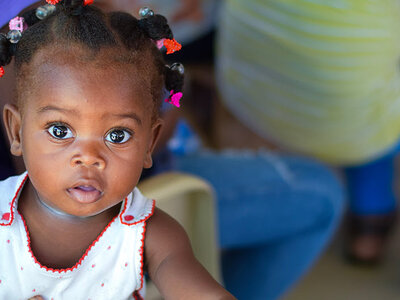Haiti
- 5.4 million
- people suffer from acute hunger
- 2 million
- people face emergency levels of hunger and require urgent assistance
- 6,000
- people are facing catastrophic levels of hunger
Haiti is the poorest country in the Latin America and the Caribbean region and among the poorest in the world.
Hunger is tightening its grip as insecurity, violence and deepening economic woes combine with climate-related shocks and other disasters.
The number of food-insecure people has tripled since 2016. A total 5.4 million Haitians – nearly half the population – do not have enough to eat. A total 2 million of these are facing emergency levels of food insecurity – an increase of 600,000 people (or 42%) since August 2023.
The number of internally displaced people (IDPs) has risen to more than 700,000 people – more than a threefold increase compared to August 2023 - following clashes between armed groups.
Latest analysis on hunger found that three-in-four IDPs are food insecure. This includes an estimated 6,000 internally displaced people (at ”catastrophe” levels of hunger – the first time this level has been recorded since September 2022, when close to 19,000 people were classified as such in Cité Soleil. This means people once again face starvation, extremely critical malnutrition, destitution and even death.
In addition, nearly 277,000 children are suffering from acute malnutrition, and 125,000 are severely malnourished.
Consumer prices for major food products are 30 to 77 percent higher than in the Latin America and Caribbean region as a whole. Farmers are also unable to sell their produce due to the blocking of various roads linking the metropolitan area to the regions.
People are also suffering from the effects of various climate shocks. On the 2021 Climate Risk Index, Haiti is third among the countries most affected by extreme weather events from 2000 to 2019.
WFP responds to emergencies while working with the Government to build sustainable systems to address the root causes of food insecurity and promote resilience.
WFP needs US$94 million to fund operations until May 2025.
What the World Food Programme is doing in Haiti
-
School meals
-
WFP supports the Ministry of Education in broadening and improving school meals in Haiti. WFP’s Home-Grown School Meals Programme has been expanded to further support the local economy and smallholder farmers, with 70 percent of children eating meals made from locally bought food. A total 340,000 schoolchildren have been receiving daily Haitian-grown school meals in 2024.
-
Support to local agriculture and markets
-
Every month during the school year, WFP buys US$1.7 million worth of local food in Haiti to be used in the school meals programme. WFP works with over 170 OPAs (Organisations de Producteurs Agricoles) – located in 9 out of 10 departments – to source food from smallholder farmers, helping maximize local economic benefits for communities. In partnership with the Ministry of Agriculture, WFP also provides capacity building to the OPAs, including technical training on storage and grain conservation, quality control and reduction of post-harvest losses. In addition, WFP subsidizes the set-up of processing facilities and assists with providing equipment.
-
Resilience building
-
Resilience activities address immediate food needs through cash transfers, while promoting the rehabilitation of assets that improve food security by mitigating, adapting to and recovering from seasonal shocks. WFP invests in disaster risk reduction, while reinforcing local agriculture, through watershed management, soil and water conservation, and canal rehabilitation activities, microinsurance coverage and provision of agricultural inputs, livestock and technical assistance. WFP’s resilience projects also enable access to basic social services and stimulate markets through rural road rehabilitation and installation of portable water points.
-
Social protection and capacity strengthening
-
WFP supports the Government in strengthening the national social protection system. WFP supports the development of the social registry, a national vulnerability database, which covers 30 percent of the population and enables effective targeting and registration of vulnerable groups. On behalf of the Ministry of Social Affairs and Labor, WFP also facilitates monthly social cash transfers to the most vulnerable households – comprising pregnant and breastfeeding women and girls, children aged 6-59 months, and persons with disabilities in the Grand’Anse Department, covering over 134,000 people. As part of its support to the social protection system, WFP invests in improving assistance models, increasing the proportion of digital cash transfers from 3 percent in May 2022 to 73 percent by September 2024.
-
Emergency preparedness
-
WFP ensures that stocks of emergency food are on standby in strategic locations prior to the start of the hurricane season, which runs from June to November each year. Emergency stocks pre-positioned by WFP have enabled a swift response to every crisis for the past decade, in coordination with the Directorate of Civil Protection. By combining investments in key components of a shock responsive social protection system, such as the social registry and digitized transfers, with early-warning systems, WFP also helps the Directorate of Civil Protection provide SMS messaging warning ahead of storms, and provides innovative anticipatory cash transfers to help affected populations limit the impact of adverse climate events.
-
Nutrition
-
WFP screens children for malnutrition at the community level, in collaboration with the Ministry of Health, referring those in need of treatment to health centres, while also providing specialized nutritious food. WFP also offers nutrition education, through classes and counselling, to people living with HIV. Fifty schools were involved in a pilot programme to promote gender and nutrition among 3,000 students, over 4,000 parents and 12,000 community members, including through workshops and radio shows.
Haiti news releases
Go to pagePartners and donors
Find out more about the state of food security in Haiti
Visit the food security analysis pageContacts
Office
Programme Alimentaire Mondial, Juvenat 7, Pétion-Ville
Port-au-Prince
Haiti







